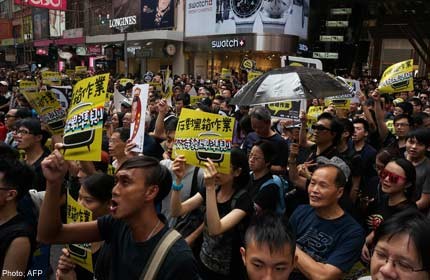Hong Kong's TV licence ruling: Bid to force probe fails

HONG KONG - The Hong Kong government has averted a legislative vote that would have forced a rare probe into its decision to grant TV licences to companies controlled by billionaires Li Ka-shing and Peter Woo but not to start-up entrepreneur Ricky Wong.
Still, the dispute has raised questions about "black-box policymaking", Beijing interference and preferential treatment of tycoons - and these issues are unlikely to go away easily.
Lawmakers on Thursday did not succeed in passing the motion to invoke special powers to force the Executive Council to make public the documents relating to the case.
Yet, even those who dissented made clear their dissatisfaction with the way the Leung Chun-ying administration handled the situation. Mr Christopher Chung of the largest pro-establishment party, the Democratic Alliance for the Betterment and Progress of Hong Kong, said: "The government has handled the case poorly and failed the public."
The vote came after a three-week sit-in protest at the government complex and massive rallies. The government's ratings are at a record low.
What many found particularly frustrating was how the government appeared to have "changed its goalposts midway", as lawmaker Peter Cheung put it.
Government policy since 1998 has stated that there would be no cap on free-to-air licences, while the broadcast authority recommended issuing three new licences. Yet, after three years of closed-door discussions, the government last month announced its decision to award just two licences, saying a "gradual and orderly approach" should be adopted.
On Tuesday, it said a consultancy report showed the TV market is unable to support five operators.
It did not give any reason for rejecting Mr Wong's bid, which appeared to be the most competitive. The lack of transparency aroused suspicions that Beijing had interfered in the decision for fear that Mr Wong's TV station could become a vehicle for "pro-democracy forces". A mainland source confirmed to The Straits Times that Beijing did have a hand in the decision.
For people such as salesman Aaron Tang, 32, who joined the protest, it "is no longer just about a TV licence, but about freedom of expression".
For others, the issue is simply that the quality of TV programmes here has declined, with TVB and ATV often screening reruns and imported shows.
Said housewife Mary Koh, 49, said: "For those of us who cannot afford cable TV, we just want to be able to watch good shows."
xueying@sph.com.sg

Get a copy of The Straits Times or go to straitstimes.com for more stories.